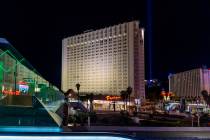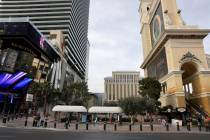Caesars’ loss doubles due to charges, business lost to Sandy
Caesars Entertainment Corp. said Monday that its fourth-quarter net loss more than doubled from a year earlier primarily because of noncash impairment charges and lost business in Atlantic City caused by Superstorm Sandy.
Caesars, which operates 10 resorts on or near the Strip, reported a net loss of
$469.7 million for the three months ended Dec. 31, which was 113 percent higher than the net loss of $220.6 million in the same quarter of 2011.
The net loss translated into a loss per share of $3.75, compared to a loss per share of $1.76 in the previous fourth quarter.
The decline was not a surprise.
Caesars preannounced quarterly results this month when the company said it was issuing
$1.5 billion in new debt to pay down existing loans while extending due dates to 2020. The net loss fell within the range predicted by Caesars.
KDP Investment Advisors gaming analyst Barbara Cappaert said the company improved its debt maturity profile.
“Nonetheless, the company remains highly leveraged on a consolidated basis,” Cappaert told investors. “We see little actual debt reduction while operating growth will not have a meaningful impact on leverage metrics.”
The company’s noncash impairment charges totaled $448.2 million in the fourth quarter while it estimated that Hurricane Sandy caused the cash flow at Caesars’ four Atlantic City casinos to fall by $35 million to $40 million because of the closures.
Caesars said its net revenues in the fourth quarter declined 4.3 percent to $2.02 billion because of the lost business in Atlantic City. For the full year, Caesars said its net revenues grew less than 1 percent to $8.58 billion.
Caesars Entertainment Chairman Gary Loveman said his company made progress in 2012 on its business strategy, which included enhancing older resorts while opening new growth markets.
“In our core business, we were encouraged by double-digit growth in customer spend per trip in our Las Vegas region, and an overall 6.2 percent increase in that key metric,” Loveman said.
On the Strip, Caesars net revenues declined 3.2 percent to $742.6 million, partly because of the impact from the Project Linq construction, which closed O’Sheas, several Harrah’s Las Vegas retail outlets, and the continued transformation of the Imperial Palace into The Quad.
The Strip properties contributed more than 35 percent of Caesars’ overall company revenues in 2012.
Loveman said the opening of the
$550 million Linq retail, dining and entertainment development later this year, the recent opening of redesigned Nobu Hotel at Caesars Palace, and the redesign of Bill’s Gamblin’ Hall, which will be completed in 2014, will enhance the company’s Strip operations.
Caesars is scheduled to open the
$400 million Horseshoe Casino Cincinnati next week, the last of the company’s two Ohio casino jointly owned with Rock Gaming.
In the Internet gaming business, the company’s Caesars Interactive Entertainment subsidiary acquired a social gaming company was licensed in Nevada for online poker and is watching events in New Jersey, where online gaming is expected to be legalized.
“The fourth quarter capped a year that was marked by significant progress on our strategy to reinvigorate our core business, expand our domestic distribution network, pursue growth online and internationally and continue to improve the company’s capital structure,” Loveman said.
Caesars said its net revenues in Atlantic City fell 19.2 percent to
$335.1 million in fourth quarter because of the storm. For the year, Atlantic City revenues for the company fell 8.6 percent in all of 2012.
Caesars Entertainment shares closed at $11.71, Monday up 12 cents, or 1.04 percent, on the New York Stock Exchange. In after-hours trading, Caesars shares fell 86 cents, or 6.34 percent, to reach $10.85 at 5 p.m. PST.
$469.7 million
net loss for Caesars Entertainment in the fourth quarter of 2012
$220.6 million
net loss for Caesars Entertainment in the fourth quarter of 2011
113 percent
increase in net loss, attributed to noncash impairment charges and lost business in Atlantic City

















